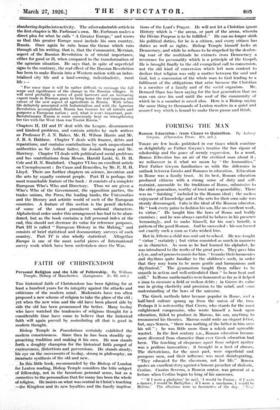FAITH OF CHRISTENDOM
Personal Religion and the Life of Fellowship. By William Temple, Bishop of Manchester. (Longman. 2s. 6d. net.) THE historical faith of Christendom has been fighting for at least a hundred years for its integrity against the attacks and criticisms of the modern mind. Modernists have too often proposed a new scheme of religion to take the place of the old ; yet when the new wine and the old have been placed side by side the old has been pronounced the better. Many to-day who have watched the tendencies of religious thought for a considerable time have come to believe that the historical faith will again prevail by assimilating all that is good in modern thought. .
Bishop Temple in Foundations certainly exhibited the modern consciousness. Since then he has been steadily ap- proaching tradition and making it his own. He now stands forth a doughty champion for the historical faith purged of excrescences, distortions and perversions. He stands steady, hie eye on the movements of to-day, strong in philosophy, an
incarnate synthesis of the old and new. .
In this little book, recommended by the Bishop of London . for Lenten reading, Bishop Temple considers the trite subject of fellowship, not in the luxurious personal sense, but as a corrective to the personalism that for many has been the whole of religion. He insists on what-was central in Christ's teaching —the Kingdom and its new loyalties and the family implicate
_ tions of the Lord's Prayer. He will not let a Christian ignore History which is the arena, or part of the arena, wherein the Divine Purpose is to be fulfilled." He can no longer shirk his political duties, for he is a citizen, and every citizen has duties as well as' rights. Bishop Temple himself looks at Democracy, and while he refuses to be stupefied by the deafen- ing roar of the multitude he extracts from Democracy a reverence for personality which is a principle of the Gospel.
• He is brought finally to the old evangelical call to conversion, not the old kind of conversion which left men content to declare that religion was only a matter between the soul and God, tont a conversion of the whole man to God leading to a . fulfilment of the obligations that arise because the Christian is a member of a family and of the social organism. • Mr. Bernard Shaw has been saying for .the last generation that no man can save his soul- Until. the soul- of the community of which he is a member is saved also. Here is a Bishop saying the same thing to thausan. ds of Lenten readers in a quiet and assured Way which is bound to make them pause and think.






















































 Previous page
Previous page